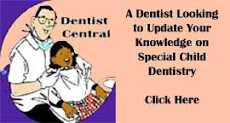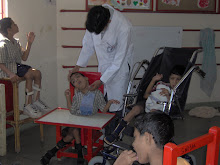
Cerebral palsy (CP) is a term used to describe a group of chronic conditions affecting body movements and muscle coordination. It is caused by damage to one or more specific areas of the brain, usually occurring during fetal development, or during infancy. It can also occur before, during or shortly following birth.The condition affects as many as 1 in every 500 children and is the most commonly occuring neuromuscular disorder. It is not a disease but a condition, and while it cannot be "treated" in the conventional sense, the adoption of
various therapeutic and preventive measures can certainly improve the quality of life of the individual with cerebral palsy. Over the past three decades, the awareness about the management of children with CP in India has increased dramatically and with that the so has their life expectancy.Where 30 years ago a child with severe CP would have been given " Five years at most" today such children go on to live for 20 to 30 years. Studies show that with proper medical care the life expectancy for individuals with mild forms of CP is comparable to the general population.
This increased life expectancy has meant that dental care for these children can no longer be viewed as a luxury. Finding a dentist who is trained to treat a child with CP can be difficult, and is almost always (especially in severe cases) expensive. A parent must therefore look out for early signs of dental disease and try their level best to prevent the disease.
What Effect Does Cerebral Palsy Have on your Child's Mouth?
Cerebral Palsy and Tooth Decay
The severeity of caries in your child can depend on the level of preventive care


Cerebral palsy by itself does not cause tooth decay. Despite some common misconceptions, CP does not make the teeth more brittle or deficient in calcium. The increased tooth decay seen in children with CP is a direct result of poor oral hygiene. Children with CP have weak co-ordination of the oral muscles. This means that the child cannot swallow as effectively as others, resulting in the accumulation of food in the mouth which increases the risk of
dental caries or tooth decay. Further, the sweet liquid syrup medications that children with CP are often prescirbed for either epilepsy, or as muscle relaxants, also increase the chance of caries.
Prevention:
Some amount of tooth decay in children with severe cerebral palsy is inevitable, but the severeity of the disease can certainly be controlled, a few points to note are
- Vigorous maintenance of oral hygiene: Start as soon as the first tooth erupts, with a piece of gauze wrapped around your finger. Avoid touching the palate or floor of the mouth.Due to a sensitive oral mucosa, the child may show violent resistance if these areas are touched.
- By the age of 2 1/2 years, shift to a soft baby brush, you can also start using a pea size drop of any special child toothpaste(See my first post on preventive care). Avoid regular toothpaste as their peppermint flavor may irritate the gums. Their high fluoride content also increases the risk of long term fluoride ingestion by the child.
- The best time to take your child to the pediatric dentist is by 1 year of age. Any defect in your child's teeth or inadequacy of oral hygeine measures are best spotted early.
- As soon as your child's teeth have erupted (by three years of age) a coat of flouride varnish to protect them against decay is advisable. Note that the sticky nature of the varnish prevents accidental ingestion of fluoride and is recommended over gels or solutions that your dentist may offer.
- A fluoridated mouthwash is NOT recommended if your child has difficulty in spitting or swallowing.
Cerebral Palsy and Gum Disease
Inability to cleanse the oral cavity with the tongue can have devastating effects on the gums. Almost all children with cerebral palsy will have moderate to severe gum disease which can manifest as, bad breath, bleeding from the gums(especially while brushing) and in very severe cases a loosening of the the teeth. Brushing the teeth regulary is the first and most important step in preventing gum disease. However if the child's swallowing pattern is severely compromised then it may not be enough. Therapeutic mouthwashes such as chlorhexidine can reduce the bacteria that cause gum disease but here again the parent should administer them only under the guidance of a dentist who is aware of long term protocol. Though chlorhexidine has almost no systemic adverse effects, it can cause staining of the teeth and increased deposits if used injudiciously. (For more details youcan see the post on therapeutic mouthrinseshttp://specialchilddentistry.blogspot.com/2008/10/dental-care-for-special-children-ii.html) Several studies have shown that chlorhexidine sprays are effective in children who have problems with rinsing. However these are not yet commercially available in India. Cerebral Palsy and the Dentition

Children with cerebral palsy often have teeth that protrude. The cause for this protrusion is an imbalance in the muscle forces that are responsible for balanced development of the face. This combined with a tendency to fall, results in a high chance of damage to the Incisors. Parents should take care to supervise the children so as to prevent trauma. Damaged incisors can often result in an inflammation of the teeth which would require root canal treatment.
Enamel hypoplasia: Some but not all children with CP suffer from poorly
developed teeth or Enamel Hypoplasia. Hypoplastic teeth are weaker and more prone to tooth decay. The cause of hypoplasia is usually the stress factors that occured during or immediately after the birth of the child. The condition is irreversible and there is no treatment.
Cerebral Palsy and Drooling of Saliva
Children with many forms of cerebral palsy may suffer from drooling of saliva. Drooling may be particularly embarrasing for parents and children alike. It results due the poor swallowing ability and weak muscles of the child and is NOT THE RESULT OF EXCESSIVE SALIVA. Since the condition affects even children with mild forms of CP who have no other intellectual disablity, it may be a barrier to them integrating with other children. Parents must however remember that reducing the the salivary flow with drugs does not help treat the condition and has an extremely harmful effect on the teeth of the child.
This post has only briefly touched upon the various oral conditions that are seen in children with cerebral palsy. In future posts i will explain in detail certain conditions and the treatment options available.
For Further Queries you can contact me;
Dr Sharat Chandra Pani
Consultant Pediatric and Preventive Dentist
Senior Lecturer
KVG Dental College
Sullia India
+919886374024












No comments:
Post a Comment